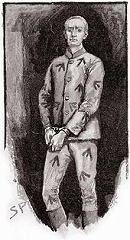“ ‘My name, dear lad, is not Trevor. I was James Armitage in my younger days, and you can understand now the shock that it was to me a few weeks ago when your college friend addressed me in words which seemed to imply that he had surprised my secret. As Armitage it was that I entered a London banking-house, and as Armitage I was convicted of breaking my country’s laws, and was sentenced to transportation. Do not think very harshly of me, laddie. It was a debt of honour, so called, which I had to pay, and I used money which was not my own to do it, in the certainty that I could replace it before there could be any possibility of its being missed. But the most dreadful ill-luck pursued me. The money which I had reckoned upon never came to hand, and a premature examination of accounts exposed my deficit. The case might have been dealt leniently with, but the laws were more harshly administered thirty years ago than now, and on my twenty-third birthday I found myself chained as a felon with thirty-seven other convicts in the ’tween-decks of the bark Gloria Scott, bound for Australia.
“ ‘It was the year ’55, when the Crimean War was at its height, and the old convict ships had been largely used as transports in the Black Sea. The government was compelled, therefore, to use smaller and less suitable vessels for sending out their prisoners. The Gloria Scott had been in the Chinese tea-trade, but she was an old-fashioned, heavy-bowed, broad-beamed craft, and the new clippers had cut her out. She was a five-hundred-ton boat; and besides her thirty-eight jail-birds, she carried twenty-six of a crew, eighteen soldiers, a captain, three mates, a doctor, a chaplain, and four warders. Nearly a hundred souls were in her, all told, when we set sail from Falmouth.
“ ‘The partitions between the cells of the convicts instead of being of thick oak, as is usual in convict-ships, were quite thin and frail. The man next to me, upon the aft side, was one whom I had particularly noticed when we were led down the quay. He was a young man with a clear, hairless face, a long, thin nose, and rather nut-cracker jaws. He carried his head very jauntily in the air, had a swaggering style of walking, and was, above all else, remarkable for his extraordinary height. I don’t think any of our heads would have come up to his shoulder, and I am sure that he could not have measured less than six and a half feet. It was strange among so many sad and weary faces to see one which was full of energy and resolution. The sight of it was to me like a fire in a snowstorm. I was glad, then, to find that he was my neighbour, and gladder still when, in the dead of the night, I heard a whisper close to my ear and found that he had managed to cut an opening in the board which separated us.
“ ‘ “Hullo, chummy!” said he, “what’s your name, and what are you here for?”
“ ‘I answered him, and asked in turn who I was talking with.
“ ‘ “I’m Jack Prendergast,” said he, “and by God! you’ll learn to bless my name before you’ve done with me.”

“ ‘I remembered hearing of his case, for it was one which had made an immense sensation throughout the country some time before my own arrest. He was a man of good family and of great ability, but of incurably vicious habits, who had by an ingenious system of fraud obtained huge sums of money from the leading London merchants.
“ ‘ “Ha, ha! You remember my case!” said he proudly.
“ ‘ “Very well, indeed.”
“ ‘ “Then maybe you remember something queer about it?”
“ ‘ “What was that, then?”
“ ‘ “I’d had nearly a quarter of a million, hadn’t I?”
“ ‘ “So it was said.”
“ ‘ “But none was recovered, eh?”
“ ‘ “No.”